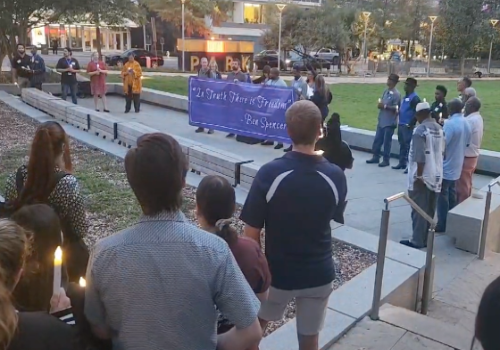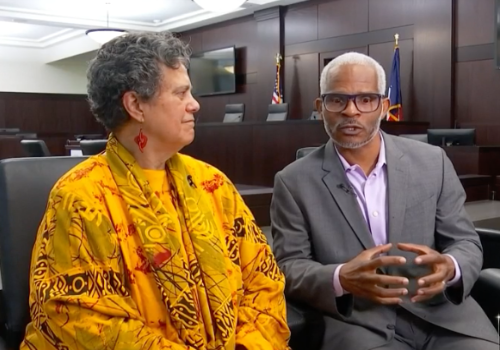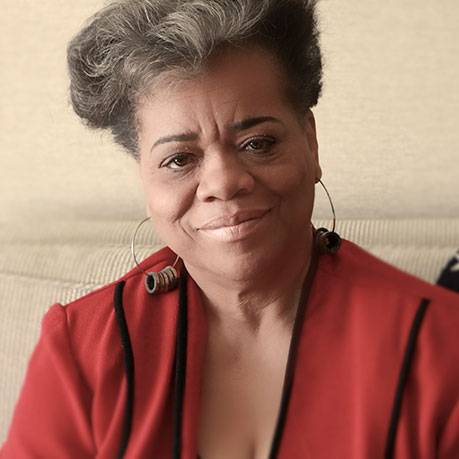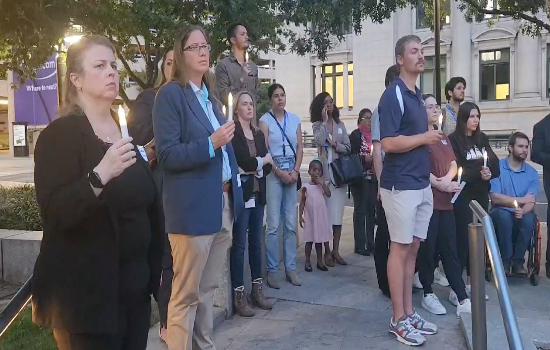College of Law Recognizes Wrongfully Convicted Texans Who Were Exonerated
October 05, 2023
United in their fight to fix the judicial system, eight wrongly convicted men, who were later cleared of all charges, came together for an emotional candlelight vigil at The University of North Texas at Dallas College of Law on Oct. 2, 2023. They were joined by loved ones of other exonerees, advocates, attorneys and criminal justice leaders all working to prevent future wrongful convictions and free others still incarcerated, whose convictions are being challenged.

Among them was Richard Miles, who served 15 years behind bars for a murder he didn't commit. Miles' conviction was thrown out and he was freed through the efforts of UNT Dallas College of Law professor Cheryl Wattley, a former criminal defense attorney and former federal prosecutor.
"We must amplify the message about wrongful convictions," said Miles. "People want to feel valued coming out of prison, to be accepted.
Since being released from prison in 2009, Miles has run a nonprofit called "Miles of Freedom" that helps exonerees and others regaining their freedom adjust to life after prison. He was named a CNN Hero in 2019.

"I met Richard in 2007 (when I began work on his case) and the relationship feels maternalistic. When he was released, his focus became helping others," said Wattley.
The inaugural event honoring International Wrongful Conviction Recognition Day, shined a light, literally, on the difficult struggle to free innocent people, repair their reputations, and welcome them back into society after time in jail or prison.
The college's Joyce Ann Brown Innocence Clinic, founded in 2016 and operated by Wattley, investigates claims of wrongful conviction by Texas inmates. Its lawyers have tirelessly and pursuasively worked on behalf of Texans in need of a second chance at freedom and justice.
"We hear you. We believe you. We're here for you. We applaud you," said Wattley.
RIght now, an estimated 3,000-9,000 Texans are serving sentences due to wrongful convictions, according the Innocence Project of Texas.
Dallas County District Attorney John Creuzot, a former judge, acknowledged the system isn't perfect. He has long advocated for citizens wrongly convicted for various reasons, including misidentification, flawed or inaccurate witnesses, incomplete or unreliable evidence, sloppy or unethical prosecutions and inadequate defenses.

"Even with safeguards, people find themselves wrongly convicted. The judicial system will never be perfect. But now it has new tools," said Creuzot. We owe it to them to shine a light on imperfections."
Creuzot's office maintains a Conviction Integrity Unit, established in 2007, which is dedicated to investigating claims of innocence, wrongful conviction and systemic errors. It was the first such office in the U.S. and has been replicated in many other jurisdictions.
Attorney Mike Ware, co-founder and executive director of the Innocence Project of Texas, said, "Dallas is ground zero, a model for the country," referring to the CIU. He said experts estimate two to six percent of Texas prison inmates were wrongfully convicted and are innocent. "It's a profound injustice," he said, that must be corrected.

The daughter of Joyce Ann Brown, for whom the UNT Dallas College of Law Innocence Clinic is named, attended the gathering, as did the brother of Tim Cole. They share a common bond, having both experienced the tragedy of their relatives' false conviction and imprisonment, and the triumph of their exoneration, even after death.
Brown was cleared of all charges and released in Nov. 1989 after serving more than nine years of a life sentence for robbing a furrier. The court set aside her conviction, citing prosecutorial misconduct. "60 Minutes" told her story twice, once while she was in prison and again after she was was freed.
Brown founded Mothers (& Fathers) for the Advancement of Social Systems (M.A.S.S.), an organization that helped families of inmates and parolees. Her work touched many families impacted by the Texas criminal justice system. Richard Miles credits Brown with helping him connect with Cheryl Wattley through Centurion, a national nonprofit dedicated to the vindication of the wrongfully convicted. Brown died in 2015.

Cole never regained his freedom. He died in prison in 1999 while serving a 25-year term for raping a young woman while a student at Texas Tech. Ten years later, Cole was enonerated by DNA evidence that implicated someone else. The Tim Cole Act, a Texas statue, provides compensation to individuals exonerated of their false, unfounded offenses. They receive $80,000 per year.
Brown's daughter Koquice Spencer and Cole's brother, Cory Session, spoke about their pain of the past and hope for the future.
"I was 11 years old when she was incarcerated, my grandother had to raise me," said Spencer.
"We have people who sometimes manipulate the justice system," said Session. "Right is right. It never changes."

After hearing the heartbreaking yet inspiring stories shared by Miles and others, attendees walked to nearby Main Street Park with candles in-hand, where the names of the eight exonerees, and others, were read aloud. Although no bullhorn was necessary, their message was loud and clear. It resonated with everyone in the crowd, and beyond. TV stations NBC5 and CBS11 reported on the event, explaining the purpose and passion behind it.
"I went in at 19 and came out at 34. The world had changed," said Miles, describing his experience and that of many others.
The UNT Dallas College of Law Joyce Ann Brown Innocence Clinic is working on additional cases for exoneration and receives continuing requests for cases to be examined. If you know any person or family coping with a potential wrongful conviction, here's what to know. The Joyce Ann Brown Innocence Clinic considers cases with the following criteria:
- Claims of actual innocence: The person seeking assistance must be in no way responsible for the crimes for which they were convicted.
- The Clinic does not review claims of self-defense.
- Sentence requirement: Five years or more remaining on your sentence.
- Post-conviction status: The trial must be completed and resulted in a conviction and sentence.
- New evidence: There is new evidence that was not available during the original trial.
If you believe your case meets the requirements and criteria for making a claim of actual innocence, please take these steps to apply to the Joyce Ann Brown Innocence Clinic:
1. Complete the Texas Prisoner Innocence Questionnaire.
- Please answer all questions on the questionnaire.
- If you do not know an answer, please write “I do not know.”
- If a question does not apply to your situation, please write “Does not apply.”
2. Sign the Consent for Release of Information form.
3. Mail both to the following address:
- JOYCE ANN BROWN INNOCENCE CLINIC @ UNT Dallas College of Law
1901 Main Street
Dallas, Texas 75201
The UNT Dallas College of Law offers an innovative education in a dynamic downtown Dallas location at a tuition that delivers great value. The college is fully accredited by the American Bar Association.